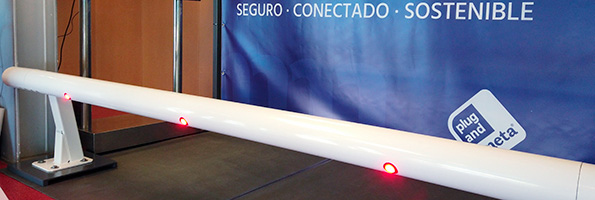Road safety
A new smart guardrail that will warn drivers of risky situations on roads has been developed
[ 13/06/2022 ]
Researchers from the Universitat Politècnica de València (UPV), belonging to the ai2 Institute, and from the company Metalesa have developed a new smart road guardrail that is capable of identifying risk situations and alerting users. Additionally, it can warn municipal authorities of accidents and events such as an impact against the guardrail or an approaching vehicle speeding, or register the passage of pedestrians on the road in question, as well as the weather conditions in the area. Designed for use on urban and interurban roads, although it can be adapted to any environment, it is the first approved guardrail on the market with built-in active safety.
To develop it, researchers at the ai2 Institute of the UPV have designed communication and control software, as well as all the electronics installed inside the guardrails, which are equipped with various sensors. They have also integrated external visibility, temperature and air quality sensors, plus a radar and a thermal camera; all these elements are used to detect risk situations, and then road users are alerted of such situations when the lighting integrated inside the parapet is switched on.
As Francisco Blanes, the ai2 Institute’s main researcher on the project, explains, "up to 10 different scenarios and behaviours of the guardrails have been defined, so that they light up depending on each of these risk situations". In this way, if, for example, there is a traffic jam on a stretch of road at the entrance to the city, the guardrail lights up and shows signs at the preceding stretch that warn drivers of the situation, thus facilitating mobility and traffic management.
In addition, this smart guardrail is also capable of collecting information –on CO2 levels, for example– and sending it, along with the other variables, to a cloud-hosted data collection platform.
Much more than a safety barrier
"The idea was that an approved containment system that had always been passive would now incorporate smart city complements that would allow it to become an active road safety system. This guardrail is much more than a safety barrier for vehicles, pedestrians, cyclists and personal mobility vehicles (PMVs)," explains César Valero, Metalesa’s Director of Digital and Technological Innovation.
The guardrail has been designed for installation in urban and interurban areas, although the system is fully configurable and its electronics are flexible in terms of their management, so that the parapet can be adapted to different environments and scenarios, depending on the needs of each city.
"It is the first of our products with PLUG&META® technology, which will allow us to include digital technology in our transport infrastructures, making them smart and promoting safety, sustainable mobility, management efficiency and citizen services", concludes Valero.
The project has also involved the company Dismuntel, located in the Polytechnic City of Innovation, the science park of the Universitat Politècnica de València. The company has provided the IoT gateway hardware infrastructure, to which the ai2 researchers have added the software for communication with the cloud and control of all the sensors external to the guardrail.
Outstanding news
 The Diamond Army
The Diamond Army
Two students came up with the UPV initiative that has engaged more than 1,600 volunteers and shattered the false myth of the 'crystal generation'
 ARWU 2024
ARWU 2024
The Shanghai ranking reaffirms the UPV as the best polytechnic in Spain for yet another year
 Distinction of the Generalitat for Scientific Merit
Distinction of the Generalitat for Scientific Merit
Guanter has been distinguished in recognition of his research excellence in the development of satellite methods for environmental applications
 The new statutes come into force
The new statutes come into force
The Universitat Politècnica de València is the first university in Spain with statutes adapted to the new LOSU
 NanoNIR project against breast cancer
NanoNIR project against breast cancer
UPV Researcher Carla Arnau del Valle receives an EU Marie Curie grant to develop biosensors for the early detection of this cancer
 Large artificial intelligence language models, increasingly unreliable
Large artificial intelligence language models, increasingly unreliable
According to a study by the Universitat Politècnica de València, ValgrAI and the University of Cambridge, published in the journal Nature





